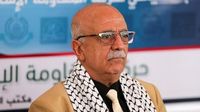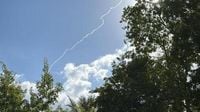On September 3, 2025, the volatile conflict between Israel and Yemen’s Houthi movement reached a dramatic new pitch. The Israeli military announced it had intercepted two missiles launched from Yemen, a stark escalation following the killing of Houthi prime minister Ahmed Ghaleb Nasser al-Rahawi and 11 other senior officials in Israeli airstrikes on Sanaa, the Houthi-controlled Yemeni capital, just days earlier. The attacks, which triggered air raid sirens twice in Israel nearly ten hours apart, marked the first time since the Gaza war’s eruption in October 2023 that missile launches from Yemen had caused such widespread alarm within Israel’s borders, according to reporting by AFP.
Houthi military spokesman Yahya Saree wasted no time in claiming responsibility. In a televised statement, Saree declared that the missiles targeted “sensitive targets” in the Tel Aviv area, specifically in Jaffa, and that the operation was a resounding success. He asserted, “The operation successfully achieved its objectives,” explaining that it “caused millions of usurping Zionists to rush to shelters, suspending airport operations.” Saree added that the attack was both a show of solidarity with Palestinians enduring “genocide and starvation in Gaza” and a direct response to the recent Israeli strikes on Yemen that killed their prime minister and other high-ranking officials, as reported by Cairo-based media.
The Houthis specified that they used two types of ballistic missiles in the operation: the Palestine 2, a multi-tipped fragmentation missile deployed for only the second time, and the Zulfiqar, a model previously utilized in their growing arsenal. The Israeli military confirmed that alerts were activated in several regions, with at least one missile intercepted before it could cause harm. The tense atmosphere was palpable as air raid sirens blared and daily life in Israel was briefly upended. The Houthis, for their part, vowed that these operations would “continue at an escalating pace during the coming period,” signaling that the missile launches were just the beginning of a broader campaign of retaliation.
The latest missile barrage wasn’t an isolated incident. Since October 2023, the Iran-backed Houthis have repeatedly launched drones and missiles at Israel, framing their attacks as acts of solidarity with the Palestinians. This ongoing campaign has included not only aerial assaults but also attacks on vessels in the Red Sea, a key global shipping lane. Each time, the Houthis have cited Israel’s offensive in Gaza as their primary motivation, a narrative they have consistently pushed in regional and international media.
Israel, in turn, has responded with force. In the wake of Houthi attacks, Israeli forces have carried out several rounds of retaliatory strikes targeting Houthi-held ports and strategic infrastructure in Yemen, including repeated bombings of the capital, Sanaa. The most significant of these came on August 28, 2025, when Israeli airstrikes killed Ahmed Ghaleb Nasser al-Rahawi, the Houthi-appointed prime minister, along with 11 other senior officials. The strike, confirmed by the head of the Houthis’ Supreme Political Council, was a severe blow to the rebel government and set off a chain reaction of reprisals and escalations.
Israeli Prime Minister Benjamin Netanyahu made no secret of his government’s intentions following the high-profile strike. In a televised cabinet meeting, Netanyahu declared, “We are doing what no one has done before us, and this is only the beginning of the strikes on senior officials in Sanaa—we will get to all of them.” He further warned that the Houthis would “pay a very heavy price for their aggression against the State of Israel,” underscoring that the campaign against Houthi leadership was far from over. According to CNN, Netanyahu’s remarks were widely interpreted as a vow to continue targeting Houthi leadership and infrastructure as long as the missile and drone attacks persisted.
The tit-for-tat violence quickly spilled over into the humanitarian sphere. On August 31, 2025, just one day after Israel announced the killing of al-Rahawi, Houthi forces stormed the offices of two United Nations agencies—the World Food Programme (WFP) and the United Nations children’s agency (UNICEF)—in Sanaa. Local security forces entered the premises, detaining several UN staff members, including at least 11 personnel, as confirmed by Hans Grundberg, the United Nations special envoy for Yemen. Both agencies said they were “urgently seeking additional information” from local authorities, with their “immediate priority” being the safety and well-being of their staff, as reported by CNN.
The detentions drew swift and forceful condemnation from the highest levels of the United Nations. Secretary-General António Guterres called for “the immediate and unconditional release” of all those detained and reminded all parties that “the personnel of the UN and its partners must never be targeted, arrested or detained while carrying out their duties for the UN.” Guterres also noted that arbitrary detentions of UN and NGO workers, as well as civil society and diplomatic staff, have been a persistent problem in Yemen since 2021. The UN and its partners pledged to “work tirelessly to secure the safe and immediate release of all arbitrarily detained individuals.”
While it remains unclear whether the storming of UN offices was directly linked to the Israeli airstrikes, the timing raised alarm in diplomatic circles. The Houthis have a history of targeting international organizations, and the latest incident only deepened concerns about the safety of humanitarian workers in Houthi-controlled areas. Moammar al-Eryani, information minister with the UN-backed government in Yemen’s south, strongly condemned the Houthis’ actions, calling them a violation of international norms and a threat to vital humanitarian operations, as reported by SABA NEWS.
Meanwhile, the broader political context in Yemen remains fraught. Since 2014, the country has been divided between the Houthi government, which controls Sanaa and much of the north, and a rival but internationally recognized administration in the south. This split has complicated efforts to broker peace and has left millions of Yemenis caught in the crossfire of a grinding civil war, compounded by external interventions and proxy conflicts.
As the Houthis and Israel exchange threats and strikes, the situation on the ground grows ever more precarious. The Houthis’ repeated vows to escalate their operations, coupled with Israel’s determination to target Houthi leadership, suggest that the cycle of retaliation is far from over. With both sides digging in and the international community struggling to protect humanitarian workers and civilians, the coming weeks may see even more dramatic developments in a conflict that has already exacted a heavy toll on the region.
For now, the world watches nervously as air raid sirens and missile alerts become the new normal from Sanaa to Tel Aviv, and as diplomatic efforts to cool tensions face daunting odds. The reverberations of these latest events are likely to be felt well beyond the borders of Yemen and Israel, touching everything from global shipping to the fate of millions of civilians in one of the world’s most volatile regions.


